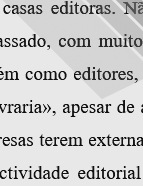

................................
He was only released in 1940, the year he left the party. Over the next few decades, he would frequently return to prison, and the publishing house often came under attack by the PIDE and censorship board. Nonetheless, Lyon de Castro managed to create a huge structure, with several imprints, a press and a bookselling network. The key moment for this growth, in the late 1950s and early 1960s, was the launch of "Cell 2455, Death Row", by Carly Chessman, which sold around 100,000 copies in two months, and the signing of Jorge Amado's works, in particular Gabriela, Cravo e Canela [Gabriela, Clove and Cinnamon], yet another success. (N. Medeiros, Idem, 2010, pp. 175-191.)
In the non-fiction, academic area, Europa-América had a significant impact in its early days with the "Saber" collection, divided into various sections, resulting from an agreement with the Presses Universitaires de France to launch translations of the "Que sais-je?" collection. But it went further, publishing Portuguese authors - A Inquisição Portuguesa [The Portuguese Inquisition], by António José Saraiva, for example - and authors from other countries. The year 1954 marked the start of a new collection, Estudos e Documentos [Studies and Documents] with volume VII of Ensaios [Essays], by António Sérgio (a name that would, however, remain more closely linked to Sá da Costa), and it also published works such as Para a História da Cultura em Portugal [Towards a History of Culture in Portugal], by António José Saraiva, and Geografia e Economia da Revolução de 1820 [Geography and Economy of the 1820 Revolution], by Fernando Piteira Santos. At times of greater momentum, one title a month would be launched in this collection, mainly on current affairs, but also historical themes. (N. Medeiros, Idem, 2010, pp. 175-191.)
In 1953, Livros Horizonte was founded by Rogério de Moura (1925-2008), whose career began by importing books from Brazil, where his brother was also a publisher. In his professional life, he had already worked for the Editorial Confluência [Confluence Publishing House], which he would eventually purchase and where he published a revised and updated edition of the Grande Dicionário da Língua Portuguesa [Large Dictionary of the Portuguese Language], by António de Morais Silva. (N. Medeiros, Idem, 2010, pp. 167-168.) From the outset, Livros Horizonte had a firm foothold in the area of non-fiction, particularly history. Of particular note is the "Horizonte Collection", directed by Joel Serrão and featuring names such as A. H. Oliveira Marques, Joaquim Barradas de Carvalho, Orlando Ribeiro, Vitorino Magalhães Godinho, José-Augusto França and João Medina, among others. Joel Serrão would also publish a considerable part of his work in this publishing house, which was organised later in his own collection (Obras de Joel Serrão [Works of Joel Serrão]), along with the complete works of Jaime Cortesão (initially in Portugália) and those of Victor de Sá.
